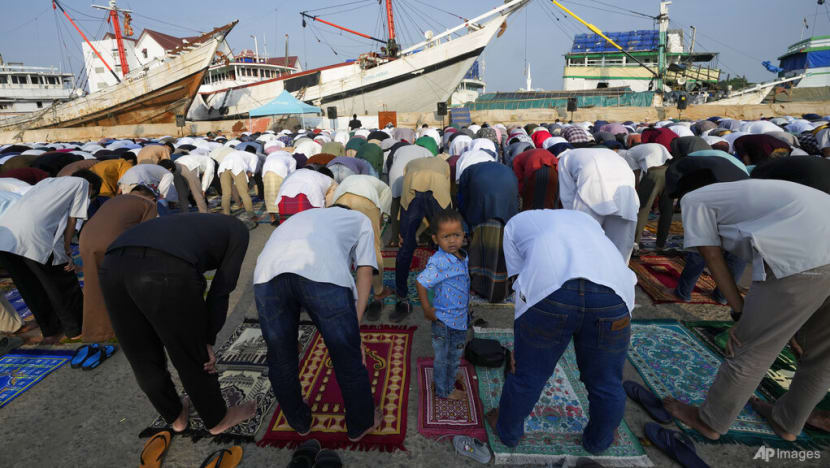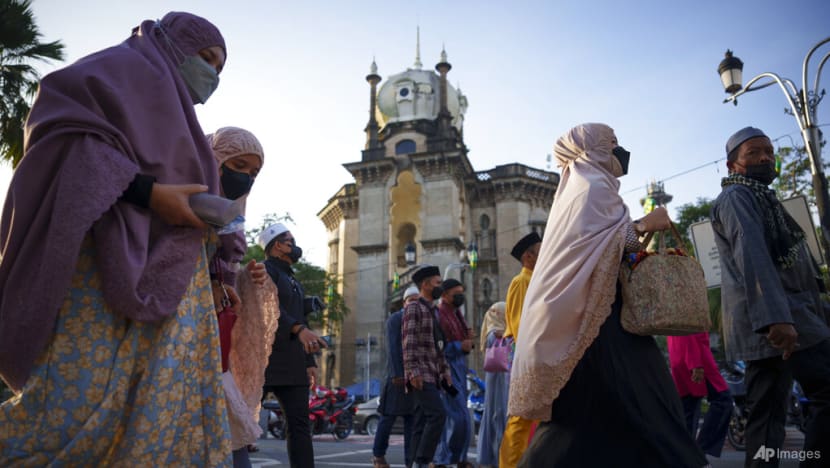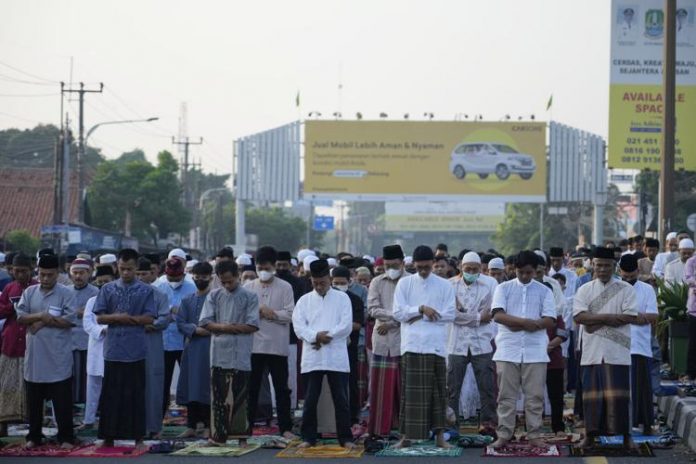The war in Ukraine and sanctions on Russia have disrupted elements of grain and fertiliser, driving up food prices at a time when inflation was once already raging. A number of Muslim-majority countries are heavily reliant on Russia and Ukraine for lots of their wheat imports, for instance
CAIRO – For the Islamic holiday of Eid al-Fitr, the smell of freshly baked orange biscuits and powdered sugar-dusted cookies typically fills the air in Mona Abubakr’s home. But due to higher prices, the Egyptian housewife this year made smaller quantities of the sweet treats, some of which she gives as presents to relatives and neighbours.
According to AP, the mother of three has also tweaked every other tradition this Eid, which began Monday (02 May) in Egypt and many Muslim-majority countries and marks the quit of the Islamic holy month of Ramadan. She bought fewer outfits for her sons to wear during the three-day feast.
“I instructed them we have to compromise on some things in order to be able to afford different things,” she said.
This year, Muslims around the world are observing Eid al-Fitr – typically marked with communal prayers, celebratory gatherings around festive meals and new clothes – in the shadow of a surge in global meal prices exacerbated by the war in Ukraine. Against that backdrop, many are nonetheless determined to enjoy the Eid amid easing of COVID-19 restrictions in their countries while, for others, the festivities are dampened by using conflict and economic hardship.
At the largest mosque in Southeast Asia, tens of hundreds of Muslims attended prayers Monday morning. The Istiqlal Grand Mosque in Indonesia’s capital Jakarta was shuttered when Islam’s holiest period coincided with the start of the coronavirus pandemic in 2020 and was once closed to communal prayers last year.
“Words can’t describe how happy I am today after two years we had been separated by the pandemic. Today we can do Eid prayer together again,” said Epi Tanjung after he and his spouse worshipped at another Jakarta mosque. “Hopefully all of this will make us more faithful.”
The war in Ukraine and sanctions on Russia have disrupted elements of grain and fertiliser, driving up food prices at a time when inflation was once already raging. A number of Muslim-majority countries are heavily reliant on Russia and Ukraine for lots of their wheat imports, for instance.
Even before the Russian invasion, an unexpectedly strong world recovery from the 2020 coronavirus recession had created supply chain bottlenecks, causing transport delays and pushing prices of food and other commodities higher.
In some countries, the fallout from the combat in Ukraine is only adding to the woes of those already struggling from turmoil, displacement or poverty.
In Syria’s rebel-held northwestern province of Idlib, Ramadan this year was tougher than in Ramadans’ past. Abed Yassin said he, his wife and three children now obtain half the amounts of products – together with chickpeas, lentils, rice and cooking oil – which last year they used to get from an aid group. It has made lifestyles more difficult.
Syria’s economy has been hammered by war, Western sanctions, corruption and a monetary meltdown in neighbouring Lebanon where Syrians have billions of dollars stuck in Lebanese banks.
In the Gaza Strip, although streets and markets are bustling, many say they cannot afford much.
“The situation is difficult,” stated Um Musab, a mother of five, as she toured a traditional market in Gaza City. “Employees barely make a living however the rest of the people are crushed.”
Mahmoud al-Madhoun, who bought some date paste, flour and oil to make Eid cookies, stated financial conditions were going from horrific to worse. “However, we are determined to rejoice,” he added.
The Palestinian enclave, which relies heavily on imports, was once already vulnerable before the Ukraine war as it had been underneath a tight Israeli-Egyptian blockade meant to isolate Hamas, its militant rulers.
Afghans are celebrating the first Eid since the Taliban takeover amid grim security and monetary conditions. Many were cautious but poured into Kabul’s largest mosques for prayers on Sunday, when the excursion started there, amid tight security.
Frequent explosions marred the period leading to Eid. These covered fatal bombings, most claimed by the Islamic State affiliate known as IS in Khorasan Province, concentrated on ethnic Hazaras who are mostly Shiites, leaving many of them debating whether it was protected to attend Eid prayers at mosques.
“We want to show our resistance, that they cannot push us away,” stated community leader Dr Bakr Saeed before Eid. “We will go forward.”

Muslim men offer Eid al-Fitr prayers to mark the end of the holy fasting month of Ramadan at Sunda Kelapa port in Jakarta, Indonesia, 02 May 2022. (Photo: AP/Tatan Syuflana)
Violence wasn’t the sole cause for worry. Since the Taliban takeover in August, Afghanistan’s economy has been in freefall with food fees and inflation soaring.
At a charity food distribution centre in Kabul on Saturday, Din Mohammad, a father of 10, said he anticipated this Eid to be his worst.
“With poverty, no one can celebrate Eid like in the past,” he said. “I wish we had jobs and work so we could purchase something for ourselves, not have to wait for people to provide us food.”
Muslims follow a lunar calendar, and methodologies, including moon sightings, can lead to different nations – or Muslim communities – declaring the start of Eid on different days.
In Iraq, fewer shoppers than traditional appeared to have visited the capital’s clothing markets this year. Security issues additionally plague celebrations, with security forces going on high alert from Sunday to Thursday to avert viable attacks after a suicide bombing in Baghdad last year in advance of another major Islamic holiday killed dozens.
In India, the country’s Muslim minority is reeling from vilification by means of hardline Hindu nationalists who have long espoused anti-Muslim stances, with some inciting against Muslims. Tensions boiled over into violence during Ramadan, including stone-throwing between Hindu and Muslim groups.
Muslim preachers suggested the faithful to remain vigilant during Eid.
Indian Muslims “are proactively getting ready themselves to deal with the worst”, said Ovais Sultan Khan, a rights activist. “Nothing is as it used to be for Muslims in India, including the Eid.”
Still, many Muslims elsewhere had a good time reviving rituals disrupted by pandemic restrictions.
Millions of Indonesians have crammed into trains, ferries and buses ahead of Eid as they poured out of principal cities to celebrate with their families in villages in the world’s most populous Muslim-majority country. The return of the tradition of homecoming prompted great excitement after two years of subdued festivities due to pandemic restrictions.
“The longing for (the) Eid celebration in a regular way has finally been relieved today although the pandemic has no longer yet ended,” said Hadiyul Umam, a resident of Jakarta.
Many in the capital flocked to shopping facilities to buy clothes, shoes and sweets before the vacation despite pandemic warnings and food price surges.

Muslims wearing protective masks head to the National Mosque for Eid al-Fitr prayers in Kuala Lumpur, Malaysia. (Photo: AP/Vincent Thian)
Muslims in Malaysia have been also in a celebratory mood after their country’s borders fully reopened and COVID-19 measures had been further loosened. Ramadan bazaars and shopping malls have been crammed with shoppers ahead of Eid and many travelled to their hometowns.
“It’s a blessing that we can now go back to celebrate,” stated sales manager Fairuz Mohamad Talib, who works in Kuala Lumpur. His family will have a good time at his wife’s village after two years of being apart due to earlier travel curbs.
There, he said, they will go to neighbours after the Eid prayers, chanting praises of Prophet Muhammad, and sharing food at each stop.
“It’s not about feasting however about getting together,” he said ahead of the holiday. With COVID-19 still on his mind, the household will take precautions such as wearing masks during visits. “There will be no handshakes, just fist bumps.”
New Malaysia Herald publishes articles, comments and posts from various contributors. We always welcome new content and write up. If you would like to contribute please contact us at : editor@newmalaysiaherald.com

Facebook Comments